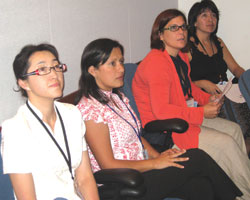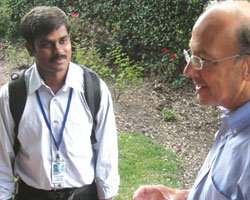Scholars program broadens view
July - August, 2009 | Volume 8, Issue 4
In its sixth year, the Fogarty International Clinical Scholars/Fellows program has expanded the horizon of global health research training to encompass the rising risks of chronic diseases.
"It's changed in character," says Fogarty Director Dr. Roger I. Glass. "In a short time, interest in global health has broadened beyond infectious diseases to the many non-communicable diseases that have already become the leading causes of death and disability in many low- and middle-income countries."
He notes that enrollment in the program expanded to include trainees in cardiology, cancer, trauma surgery, dentistry, veterinary medicine, pediatrics, ophthalmology and genetics. More than half the scholars and fellows are women.

From left, Dr. Yan Li of China, Dr. Magaly Blas
of Peru, Dr. Guillermin Melendi of Argentina
and Dr. Peggy Martinez Esteban of Peru are
prepared to present summaries of their
projects to global health experts from other
NIH institutes and centers.
From induced sputum for tuberculosis diagnosis (Dr. Jonny Peter of South Africa) to a fatal fungus (Dr. Thuy Le of Vietnam), from dietary salt reduction strategies (Dr. Yan Li of China) to prevention of traffic fatalities in Malawi (Dr. Jonathan Samuel of the United States), the fellows program has, indeed, taken on a more eclectic nature.
The program, supported by Fogarty, 14 other components of the National Institutes of Health and the American Recovery and Reinvestment Act, is administered by Vanderbilt University's Institute for Global Health and the Association of American Medical Colleges.
It has paired 160 U.S. third-year medical students with an equal number of counterparts at 29 sites in 17 developing countries and, in the two years of postdoctoral awards, supported 26 U.S. and 30 international fellows in their independent research in 14 countries.

Fogarty Director Dr. Roger I. Glass chats with
Dr. Rosario Viveka, who plans to study the
role of food in transmission of eneteric
infections in his native India. Glass says the six-
year-old scholars and fellows program has
changed character as the burden of disease
has broadened to include chronic illnesses.
"This is one of the premier signature programs at Fogarty," Glass recently told a group of global health advocates from across the NIH. "Our hope is that this is really a partnership with all of the other institutes because if (the trainees) are good researchers, they will come to you in the future as grantees."
Fogarty's Dr. Pierce Gardner, a consultant to the program, likens the idealism of this year's crop of 88 trainees to that of civil rights workers in the 1960s.
Global health "is on the front pages like never before," he says, drawing agreement from Fogarty fellow Dr. Gerald Bloomfield, who notes, "We're no longer looking just in our own back yards. You can't see real poverty with your own eyes and ever see things the same again."
Gardner is proud of the recent crop of scholars and fellows for delaying loan repayments and possibly forgoing highly compensated careers, noting wryly, "Experience in global health ruins people for Park Avenue practices."
Ten of the foreign research sites hosting scholars and fellows are also newly designated centers for the study of chronic diseases by the National Heart, Lung and Blood Institute, in conjunction with UnitedHealth Group's Chronic Disease Initiative. (See article on Chronic diseases: a 21st century epidemic.)
More Information
To view Adobe PDF files,
download current, free accessible plug-ins from Adobe's website.